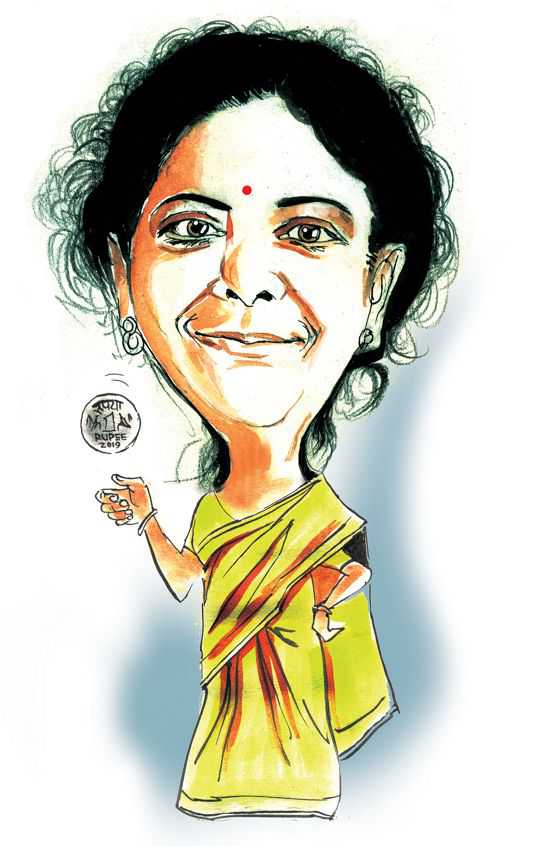Vibha Sharma in New Delhi
IT is a strange coincidence that an alumnus from the Left-leaning Jawaharlal Nehru University is occupying the high chair in the most powerful gathering of India, the Cabinet Committee of Security, in a government led by the “Hindutva, Right- wing party”, the BJP. Nirmala Sitharaman started out as a Minister of State (Commerce) in the previous NDA government, rose to be the Defence Minister. On Friday, she was announced to be India’s first full-time woman Finance Minister.
JNU’s Left-leaning student leaders like Kanhaiya Kumar gave the saffron party its ‘tukde-tukde’ poll plank around which it successfully weaved the national security narrative for 2019, once again riding to the Lok Sabha with a thumping majority. And not just her, another member of the exclusive CCS, External Affairs Minister S Jaishankar, is also from the JNU.
After graduation in economics from Seethalakshmi Ramaswamy College in Tiruchirapalli, Sitharaman did her Masters in Economics and MPhil in textile industry and Indo-European trade from JNU, where she was also a member of the Free Thinkers, a forum that discussed politics of both the Right and the Left wing. It is here she met her future husband, Parakala Prabhakar, from Andhra Pradesh, whose father had served as a minister several times from the Congress.
Sitharaman, a politician who has seen a meteoric rise in the recent times, has stepped into the shoes of her mentor, former Finance Minister Arun Jaitley for the second time. Prior to this, she had taken over from Jaitley, who was then filling for his colleague, late Manohar Parrikar, the Defence Minister, in September 2017. And in this she has earned herself the distinction of becoming only the second woman to hold the reins of the Finance Ministry. The other person to hold the post was the late Indira Gandhi, who held it as an additional charge.
Those who have worked with Sitharaman in what is perceived as “a male bastion”, say she is “quick in grasping matters” and a “good adaptor”. Despite the complexities of the protocol-ridden Defence Ministry, she is said to have done a “fair job”, taking some important decisions with regard to high-value procurements and Prime Minister Narendra Modi’s pet project, ‘Make in India’, while stridently defending him on the Rafale jet deal, the Opposition Congress’ chief poll plank in the run-up to the LS elections.
Occupying the chair that some of India’s stalwarts — like Jawahar Lal Nehru, VK Krishna Menon, Pranab Mukherjee, Indira Gandhi and George Fernandes have held — she is rated as a “sharp, no-nonsense and hard-working person who did her best in a ministry riddled with deep issues”.
Interestingly, Sitharaman was almost written off after she failed to get the Lok Sabha ticket in 2014 while Meenakshi Lekhi, her counterpart on the BJP spokespersons’ list, had managed one. However, she was handpicked by Modi as the MoS, Commerce and Finance, and brought in via the Rajya Sabha largely on the basis of her credentials as an articulate English-speaking BJP spokesperson, her non-controversial background, her strident defence of the party, backed by impeccable knowledge on a range of subjects, her southern origins and, most importantly, her understanding of the protocol in the “new BJP” as it was emerging then. She is a “perfect example of a good person in politics,” say her associates.
Sitharaman joins the Finance Ministry at a time when India is passing through its toughest phase — economic slowdown, dipping exports, mounting non-performing loans, joblessness, farm distress... As the FM, she will be occupying the chair once graced by many of India’s former PMs, including top economist Manmohan Singh. Her background in economics will help, but it is a tough challenge ahead for her and her deputy, Anurag Thakur, in the two ministries — Finance and Corporate Affairs — they have been assigned.
India’s economy is beginning to sputter on the back of consumption and private investment slowdown. Fixing this and jumpstarting the economy would be her top priority, followed by putting the banking and NBFC sectors in order along with addressing agricultural distress — and all this without disturbing the fiscal position of the government. Mentor Jaitley is expected to guide the duo.
It is difficult to say what are her plans, but, this is what she had told us back then when she first took over as the Commerce Minister in 2014: “India is a very strong market. The Indian consumer — rich, middle-class, poor — has the purchasing power. It may be somewhat depressed because of the poor economic situation, but day-to-day bare essentials also make a very big market. We cannot undermine the size of this market by allowing everyone to come and do anything they want, this is one side. The other side is that this market is a big power in our hands. We have to liberate it in a way that India’s manufacturers get the first right to serve this market. Later, they can go out and sell as much as they want. Investment is required for making the market more refined and productive. We will ensure that investments are brought in, but without damaging the Indian market.”
Unlock Exclusive Insights with The Tribune Premium
Take your experience further with Premium access.
Thought-provoking Opinions, Expert Analysis, In-depth Insights and other Member Only Benefits
Already a Member? Sign In Now










